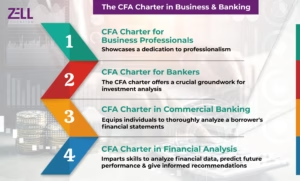The CFA Charter in Business and Banking
Last Update On 5th December 2024
Duration: 4 Mins Read
The Chartered Financial Analyst (CFA) charter is one of the most respected professional credentials, recognised globally in the financial services industry. The CFA Program is structured to teach a comprehensive foundation in investment analysis and portfolio management; the charter is widely regarded by many as the “gold standard” in the investment management field. In this article, we shall examine how the CFA charter can be helpful for business professionals and bankers.
CFA Charter for Business Professionals
For corporate finance, financial planning and analysis, and business development professionals, obtaining the CFA charter would be highly beneficial. Fundamentally, the CFA Program can help them establish a solid foundation in financial analysis work and cover all of the required principles in making the right decisions.
For instance, a corporate finance professional would need to analyse several options on financing a new project. With the knowledge and skills acquired from the CFA Program, they will be better equipped to analyse the financial statements of each option, assess the risks and returns, and make an appropriate recommendation.
Besides enhancing one’s skills, the CFA charter may also point to a commitment to professionalism and ethical standards. This can be especially valuable for business professionals operating in tightly regulated industries, such as banking or financial services.
CFA Charter for Bankers
Even commercial bankers, investment bankers, and private bankers stand to benefit by acquiring the CFA charter. A strong foundation in the discipline of investment analysis is provided by the CFA Program, which bankers will find indispensable in assessing investment and associated risks.
For instance, a commercial banker would want to determine the creditworthiness of a client. Using what he learned through CFA Programs, he will be better at analysing the financial statement of the borrower and how he could quantify the risks and returns from the loan and make a well-informed lending decision.
Similarly, an investment banker may be asked to compare alternatives that a client may finance. The CFA Program by the CFA Institute may equip him with the required skills in analysing financial data, projecting future performance, and making recommendations.
The CFA charter not only enhances skills but is also a marker of professionalism and upholding a set of ethical standards. This is particularly important for a commercial banker working in a highly regulated industry, such as banking.
CFA Charter in Commercial Banking
Commercial banking is an important business of the banking sector, and the CFA charter can equip a person with the skills to become a commercial banker. The CFA Program can provide a strong foundation in financial analysis, credit analysis, and risk management, among others, which are essential components in evaluating loan opportunities and managing risk for commercial bankers.
For instance, a commercial bank may want to determine the creditworthiness of its potential borrower. They would be much better equipped with the knowledge and skills acquired in the CFA program to analyse the borrower’s financial statements, determine the risks and rewards associated with the loan, and come up with a well-informed lending decision.
Similarly, a commercial banker may have to design and implement risk management strategies for the bank. The CFA Program will equip the skills to analyze financial data, make predictions of its future performance, and recommend knowledgeable views.
Besides improving their skills, the Chartered Financial Analyst charter also provides an accomplishment that shows commitment to professionalism and ethical standards, which is important in commercial banking to industrialists who find themselves working under highly regulated industries.
Conclusion
The CFA is a world-renowned and extremely prestigious professional credential that teaches its members the core elements of investment analysis, financial analysis, credit analysis, and risk management. The benefit of the CFA is not in speaking of rigorous academic pursuit but in that, it signifies commitment, professionalism and ethical standards and equips its graduates with skills and knowledge that help to make sound decisions and manage risk. Bankers in various sectors-including commercial banking, investment banking, and private banking-can all benefit from this credential.
The CFA charter is a significant asset for people looking for a career in the financial services industry and may present them with their desired opportunities for career advancement and growth. If you are interested in a career in accounting and finance, go ahead and enroll for the CFA course; feel free to call us or connect with us at Zell Education, and we will help you in deciding. Take your first step toward a fulfilling career, today!
FAQs on the CFA Charter
What does charter mean in CFA?
The CFA charter is a professional designation given to candidates who meet the work experience requirement after passing the CFA program.
How hard is it to get a CFA charter?
It isn’t an easy task, as there are three comprehensive exams and at least 4,000 hours of work experience which need to be achieved.
Is CFA charter a degree?
No, it’s not a degree; rather, the CFA charter is an international professional course in investment and financial management worldwide.
What is the salary of a CFA charterholder in India?
In India, the salary of a charter holder would typically range between ₹12 to ₹20 lakhs per annum, according to their experience and role.
\

